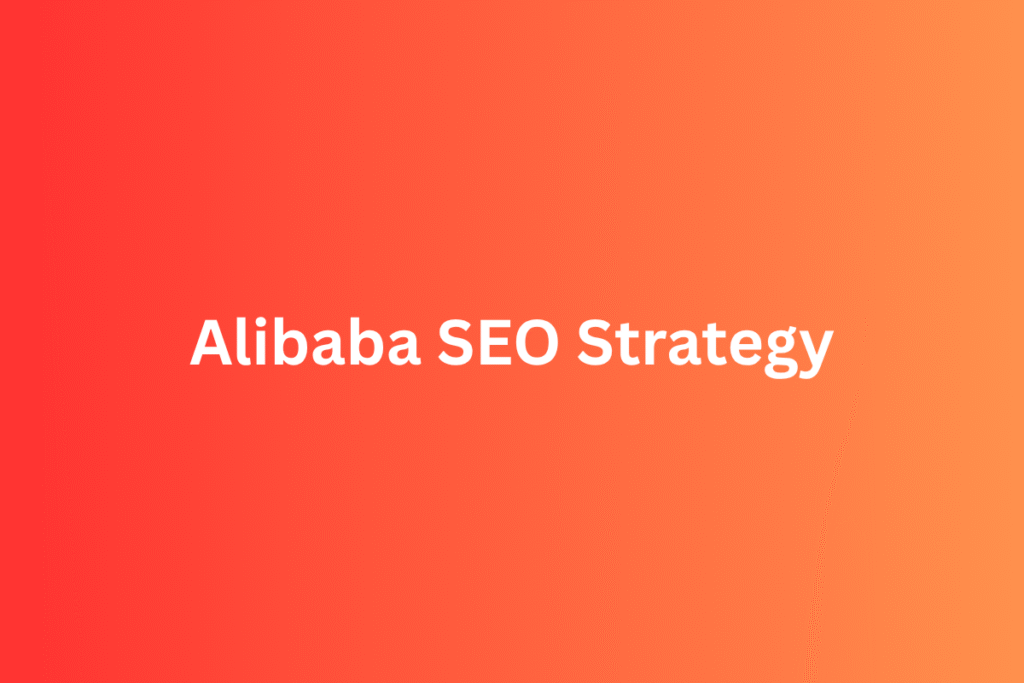When we think of global eCommerce platforms, Amazon often takes the spotlight in the West. But in Asia, Alibaba is the king. What’s surprising is that it doesn’t just dominate because of its size or reach it also wins at SEO, and not many people talk about that.
In this article, we’ll break down Alibaba’s SEO strategy not with buzzwords, but in real, practical language that helps you understand how it ranks, why it works, and what you can learn and apply to your own business.
Why Alibaba’s SEO Strategy Matters
Let’s be real Alibaba isn’t just another eCommerce site. It’s:
- A B2B marketplace
- A global sourcing platform
- A search engine for manufacturers
Unlike Amazon, Alibaba doesn’t aim to sell to individual customers. Instead, it connects wholesalers, manufacturers, and distributors across the world.
And that changes how its SEO strategy is designed.
1. Alibaba Treats SEO Like a Product
While most businesses use SEO to get traffic, Alibaba builds SEO into the very way its site works. Think about it:
- Every supplier gets a mini-website
- Every product has a searchable, indexed page
- Every category is built like a search-friendly landing page
This means millions of pages are indexed by Google, Baidu, and Bing organically, not just through ads.
Takeaway for your site:
Structure your website in a way that scales SEO naturally especially if you have products or services to list.
2. Power of User Generated Content (UGC)
Alibaba’s real SEO power comes from its suppliers and users. They create:
- Product listings
- Titles and meta descriptions
- Customer Q&A
- Reviews and ratings
Because this content is unique and updated frequently, it keeps the platform fresh in Google’s eyes.
What I noticed: Alibaba listings are often messy or written in broken English but they still rank. Why? Because volume, recency, and relevance often beat perfect grammar in SEO.
Lesson for your blog or store:
Encourage users to write reviews, ask questions, and create content. Even if it’s raw, it’s real. And that’s SEO gold.
3. Category Pages That Rank Like Blog Posts
If you Google something like “LED light wholesale” or “China bamboo toothbrush manufacturer”, you’ll often see a category page from Alibaba ranking on the first page.
Why? Because:
- Their category URLs are short and keyword-rich
- Their H1, subheadings, and filters are built around user intent
- They often add buying guides or descriptions at the bottom of the page
These pages are like landing pages for SEO, not just folders for products.
Want to copy this for your website?
Don’t just list products explain the category, add FAQs, internal links, and optimize headings. Make your category page answer the searcher’s question.
4. International SEO: Alibaba Ranks in Multiple Languages
Here’s something I admire Alibaba ranks in English, Spanish, Russian, Arabic, and even Hindi.
They use:
- Subdirectories for different languages
- Localized content (not just Google Translate)
- Hreflang tags for proper indexing in different regions
They also appear on local search engines like Baidu (China), Yandex (Russia), and Naver (Korea).
If your business is targeting multiple countries, take a page from Alibaba’s book:
Do proper multilingual SEO, not just translations. Each region has different keywords, search behavior, and platforms.
5. Internal Linking That Helps Google Understand the Site
Every Alibaba page has links to:
- Related products
- Top-rated suppliers
- “You may also like” sections
- Industry trends and buyer guides
This massive internal linking helps with:
- Lowering bounce rate
- Boosting average session time
- Spreading link juice to new or less-popular pages
It’s almost like their site is one big web, constantly connecting one product to another.
Pro Tip:
Use internal links strategically on your own site or blog. Every new blog post or product page is a chance to connect with your existing content.
6. Alibaba’s Dependence on Long-Tail Keywords
Instead of trying to rank for “shoes” or “bags,” Alibaba pages target terms like:
- “Wholesale men’s canvas sneakers factory price”
- “OEM cosmetic packaging manufacturer China”
- “Custom logo power bank supplier”
These long tail keywords may get lower search volume, but they have:
- Higher intent
- Better conversion
- Less competition
For your SEO:
Don’t chase the biggest keywords. Go after specific, problem-solving phrases your target customer would type.
7. Mobile SEO: Fast and Functional
Alibaba’s mobile experience is super-fast, even on low internet speeds (which is crucial in countries like India or Indonesia).
They optimize for:
- Fast loading time
- Clean layouts
- Large buttons for tapping
- No heavy pop-ups or distractions
Google loves mobile friendly websites and Alibaba checks every box.
If your website isn’t mobile-optimized, you’re leaving rankings and traffic on the table. Use Google PageSpeed Insights or Search Console Mobile Usability Report to fix issues.
8. Backlink Strategy Without Obvious Outreach
Alibaba doesn’t need to ask for backlinks. It gets:
- Referenced in news stories
- Shared on sourcing blogs
- Linked from forums and Quora answers
- Mentioned in trade publications
Because it’s a tool more than a store, people link to it naturally.
That’s a long-term SEO win.
You can do this too by:
- Creating a resource (like a tool, calculator, or industry report)
- Publishing original research or data
- Being featured on podcasts or guest blogs
9. Alibaba Uses Buyer Guides for Informational Queries
When someone searches for “how to import from China” or “best wholesale electronics markets”, you’ll often see Alibaba’s guides and blogs.
This is top-of-the-funnel SEO, helping users even before they’re ready to buy.
Their content is:
- Keyword-optimized
- Easy to read
- Full of CTAs that guide users to products
This strategy works beautifully, because it builds trust first, then sells later.
You can do the same. Don’t just create product pages write guides, how-tos, and comparison articles that help your audience make smarter decisions.
10. Alibaba and Baidu SEO (China-specific Advantage)
One underrated fact is that Alibaba dominates Baidu (China’s top search engine). Because it’s a Chinese-born company, it:
- Understands Baidu’s algorithm
- Has a .cn domain version
- Gets better crawlability in China
- Follows local SEO rules
If you’re ever targeting the Chinese market, you must treat Baidu like a whole different SEO planet. It doesn’t work the same as Google.
What You Can Learn from Alibaba’s SEO
Alibaba proves that SEO isn’t about tricks. It’s about building a structure that naturally attracts traffic, trust, and business.
Here’s a quick recap of what you can apply:
- Design scalable, SEO-friendly pages
- Focus on long-tail, buyer-intent keywords
- Use internal links like a web
- Optimize for multiple languages
- Create guides that help users, not just sell
- Encourage user-generated content
- Nail mobile SEO
- Think global, but act local
If you’re running a product-based business or even a service site with multiple offerings, use Alibaba as your SEO benchmark, not just Amazon.
Want SEO like Alibaba, but for your business size?
At PratsDigital, I help brands scale their organic traffic with realistic SEO strategies tailored to your niche.
Contact us for a consultation today.


